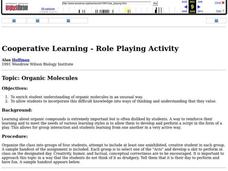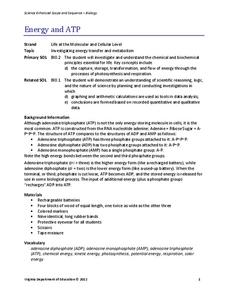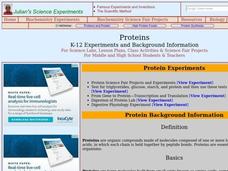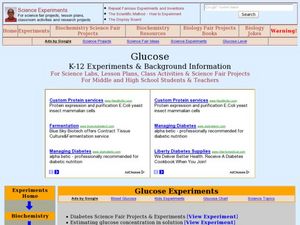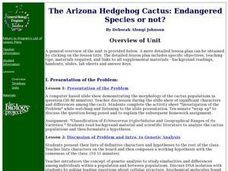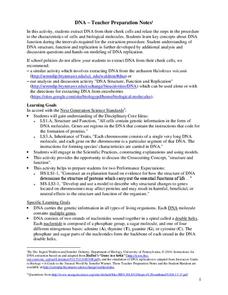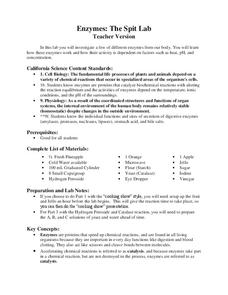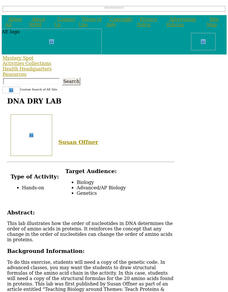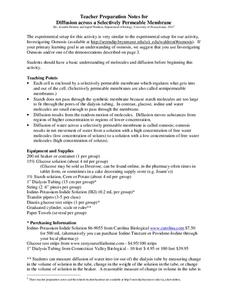Curated OER
What is Everything Made of?
Students observe a demonstration on how we see space between water molecules. For this experimental lesson students discover what elements make up the things around them and discuss what they learned.
Curated OER
Stereoisomers
Learners investigate stereoisomers using models that can be rotated and manipulated. In this stereoisomers lesson plan, students try to make models of molecules look alike by rotating the bonds. Using a mirror, the teacher demonstrates...
Curated OER
Lab Experiments in Nutrition
Looking for authentic hands-on nutritional experiments? High schoolers will perform experiments to test for the presence of vitamin C in several solutions as well as the effect of caffeine on Daphnia. They will also consider the...
Curated OER
Organic Molecules
Learners explore organic compounds. Using humor, factual and conceptual correctness, students create a skit explaining organic compounds. Learners include topics such as sugar, polymerization, unraveling of proteins, and substrates. ...
Curated OER
Non-covalent Interactions of Molecules
Students participate in a class discussion about non-covalent interactions of molecules forming and shaping the macromolecules essential in biology. Handout provided is used as an outline for discussion.
Curated OER
Biology Demos
Students participate in biology demos. In this biology lesson, students explain how energy is released in the ATP cycle. They demonstrate DNA replication process.
Virginia Department of Education
Energy and ATP
Take charge of your biology class by using this exciting analogy to relate the ATP process with batteries. Pupils use batteries and rubber bands to simulate the phosphate bonds between molecules in the body. They measure the distance in...
Curated OER
Chlorophyll
Learners explain the importance of chlorophyll in plants. For this biology lesson, students extract chlorophyll from different plant sources using chromatography. They discover the different factors needed for photosynthesis to take place.
Curated OER
Plant Hormones
Students identify different plant hormones and explain their function in plant development. In this biology lesson, students investigate how IAA affect root growth. They study the history of auxin discovery.
Curated OER
Gel Electrophoresis
Students conduct a variety of experiments to explore gel electrophoresis. In this biology lesson, explain how this process separate DNA and RNA. They discuss the practical applications of this method.
Curated OER
Proteins
Students conduct a variety of experiments to explore protein. In this biology lesson, students solve a mystery by testing for the presence of glucose, protein starch and triglycerides. They explain how DNA transcription and translation...
Curated OER
Glucose
Students conduct various experiments on glucose. In this biology lesson, students differentiate the process of diffusion and osmosis. They test different foods for the presence of glucose and starch.
Curated OER
Plankton / Phytoplankton
Students discuss the importance of plankton in the ocean ecosystem. For this biology lesson, students identify the different types plankton by observing them under the microscope. They explain how plankton population affect global climate.
Curated OER
RNA
Young scholars explain how cells reproduce. In this biology lesson, students transcribe and translate a gene. They discuss and compare their answers in class.
Curated OER
The Arizona Hedgehog Cactus: Endangered Species or not?: Biology, Plants
For this lesson students will study the: "Classification of Echinocereus triglochidiatus and Geographical Ranges of its Varieties." Students read background material and scientific literature to analyze the cactus populations and then...
Curated OER
Extracting DNA from Your Cells - Teacher Preparation Notes
Learners extract their own DNA from cheek cells. In this biology instructional activity, students explain the replication process. They identify the structure and composition of DNA.
Curated OER
Atoms and Elements: An Introduction
Students are able to discuss the difference between a proton, a neutron and an electron. They also can explain the difference between an ionic and a covalent bond. Students know the main structure of atoms and molecules. Student are able...
Curated OER
Waves and Currents
Students are introduced to the forces that are responsible for generating waves in the ocean and how these forcesf differ from those that cause currents. They are able to explain how water molecules in a wave do not move in the direction...
NOAA
Animals of the Fire Ice
When the sun's rays can't reach the producers in a food web, where does all the energy come from? Extreme environments call for extreme food sources. Young scientists investigate creatures that appear to get their energy from methane...
Curated OER
Light and Starch Production in Photosynthesis
Students are given the unique opportunity to see the contrast between parts of a leaf that have photosynthesized and parts of the leaf that have not. This visual image helps students see the results of this biological process. At the...
LABScI
Enzymes: The Spit Lab
Enzymes in our bodies each have a job to do. Learn the factors that affect the activity of some enzymes using the third activity of an informative 12-part biology series. A three-part laboratory activity asks teams to investigate how...
Curated OER
DNA Dry Lab
Students use a DNA strand to identify the component parts. They discuss an RNA molecule, protein fragments, and nucleotides. They explore how the order of nucleotides determines the order of amino acids in proteins.
Curated OER
Energy Extravaganza
Tenth graders study how cells and organisms acquire and release energy through photosynthesis and cellular respiration. They explain that living organisms use matter and energy to synthesize a variety of organic molecules and they will...
Curated OER
Diffusion Across a Selectively Permeable Membrane
Students investigate how water passes through cell membranes. In this biology instructional activity, students differentiate osmosis and diffusion. They illustrate the movement of water in both processes.



